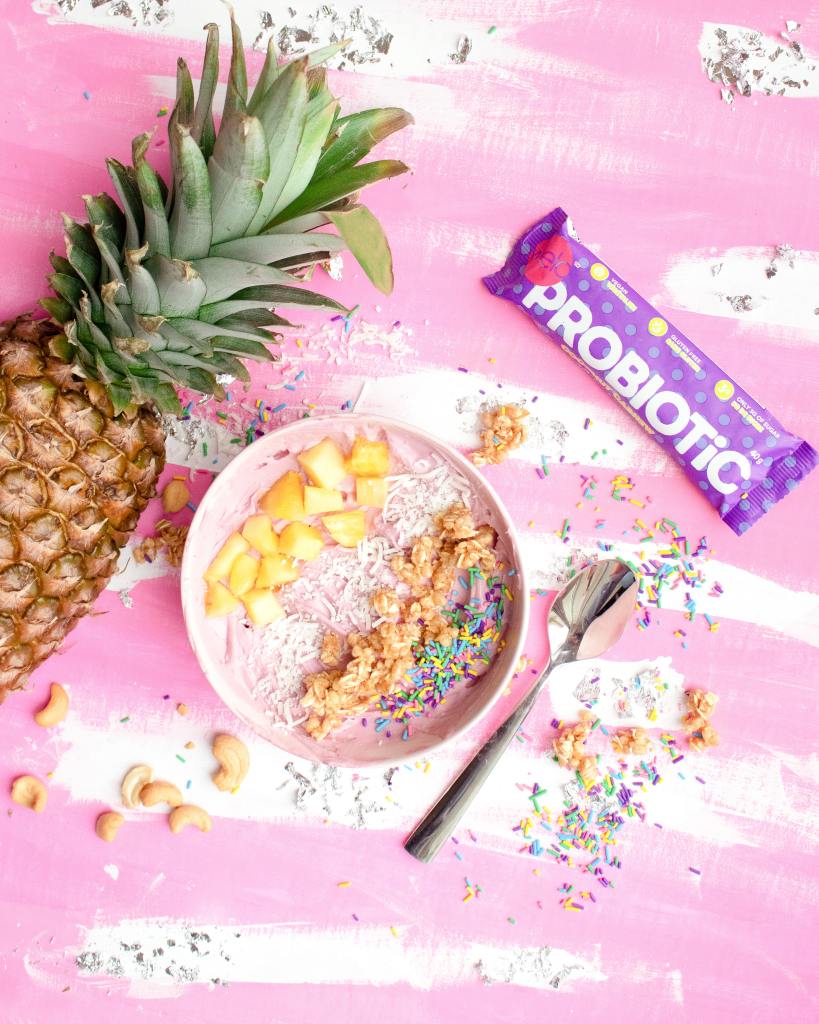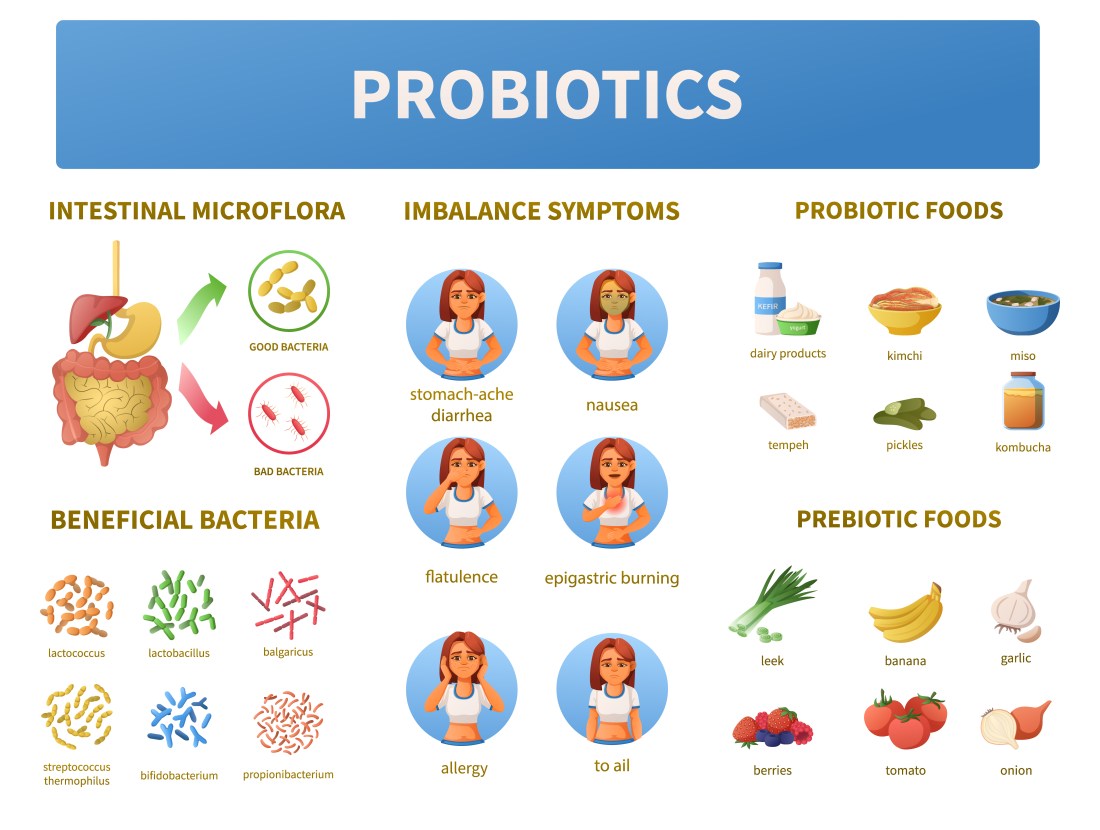7 MINUTES READING TIME
Did you know that your mental health can be greatly affected by the condition of your digestive system?

The Gut-Mind Connection
The Science Behind the Gut-Mind Connection
How Gut Imbalances Contribute to Anxiety and Depression
Enhancing Cognitive Function and Memory
Optimizing Your Mental Well-being with a Probiotic Lifestyle
Understanding how Probiotics work
Be aware of possible side effects
How Can I incorporate Probiotics into My Routine?
Things are important to consider before adding this supplement
Which products contain natural probiotics and prebiotics
Prebiotics and why do we need them?
Other Ways to Improve you Gut and Mind Connection
Probiotics’ role in Gut & Brain Harmony
The Gut-Mind Connection
The gut-mind connection, a remarkable relationship between the digestive system and our mental health, demonstrates how closely related these two functions are. The good bacteria in our stomach, known as probiotics, play an essential role in fostering this relationship and may be beneficial for both our physical and mental health. Healthy gut is one of important parts of anti-aging philosophy. Come along on a journey of discovery as we examine how probiotics can unleash the mysteries of the gut-mind link as we delve into this fascinating area of study.
The Science Behind the Gut-Mind Connection
Both researchers and health enthusiasts express great interest in the complex relationship between the mind and the stomach.The gut-brain axis, often referred to as the mind-gut link, is the mutually beneficial communication line that connects our central nervous system and the gut bacteria. In addition to affecting our digestive health, this intriguing relationship also has a significant impact on our mood, emotions, and cognitive performance.


How Gut Imbalances Contribute to Anxiety and Depression
The mind-gut link enables us to understand how our thoughts and emotions can affect the condition and operation of our digestive tract.
Numerous studies have proven that stress, anxiety, and other psychological factors have a major impact on gut health. Our brains transmit messages to the gut when we are under stress, which can impair digestion, induce gastrointestinal pain, and even exacerbate illnesses like irritable bowel syndrome (IBS). On the other hand, messages from an unhealthy stomach can affect the brain, causing mood disorders and cognitive abnormalities.
Enhancing Cognitive Function and Memory
New studies have also illuminated how gut bacteria affect mental health and brain function. The gut microbiota, which refers to the billions of microbes that live there, is extremely important for controlling neurotransmitters like serotonin and dopamine, which are essential for preserving mental stability. Depression, anxiety, and even neurodegenerative illnesses have all been linked to imbalances in the gut flora. Our health and well-being can be greatly impacted by comprehending and using the power of the mind-gut connection. Let’s talk about probiotics and the way they can help us to improve our gut function…

Optimizing Your Mental Well-being with a Probiotic Lifestyle
Probiotics have piqued the interest of health enthusiasts worldwide due to their potential to improve general well-being. These living microbes, sometimes known as “good bacteria,” have become more well-known because of their capacity to improve digestion, fortify the immune system, and support gut health. Investigating probiotics’ benefits, looking into any potential negative effects, and figuring out the best approach to incorporate them into our daily lives are all important.
Understanding how Probiotics work
Probiotics have several beneficial benefits on our bodies, first and foremost. These helpful bacteria help to maintain a healthy balance of microorganisms by colonizing the stomach, ensuring proper digestive function. They make it easier for food to break down, improve nutritional absorption, and ease typical digestive problems like bloating and constipation. Additionally, probiotics are essential for boosting our immune system since they encourage the formation of antibodies and boost immune cell activity, which helps us fight off diseases and infections.
Be aware of possible side effects
However, it’s crucial to be informed of any possible negative effects that could result from using probiotics. When first adding probiotics to their diet, some people may occasionally suffer mild digestive discomforts, such as gas or bloating. These signs and symptoms are frequently transient and usually go away as the body gets used to the new germs. Rarely, people with compromised immune systems or underlying medical disorders may experience more serious effects. Before beginning any new supplement, it is imperative to seek medical advice, especially if you have ongoing health issues.
How Can I incorporate Probiotics into My Routine?
The majority of people are typically thought to be safe taking probiotics every day. Live bacteria known as probiotics can be received through particular meals or supplements in addition to being naturally present in our stomach. They are typically accepted and have been consumed for ages.

Things are important to consider before adding this supplement
Quality and Source
Pick probiotic supplements of the highest caliber from reliable manufacturers. Select goods that have passed stringent purity, potency, and safety tests. If you choose probiotic-rich foods, make sure they are kept fresh and in the right conditions.
Underlying Health Conditions
It’s important to speak with a doctor before beginning any new supplement regimen, including one with probiotics, if you have a compromised immune system, are unwell, or have recently had surgery.
Particular Strains
The effects of various probiotic strains on the body can vary. While others may be better for overall gut health, some strains may be more suited for treating particular medical issues. It’s critical to select probiotics that suit your particular health requirements.
Dosage and Duration
Comply with the manufacturer’s or a healthcare provider’s recommended dosing guidelines. Probiotic dosages that are too high can cause intestinal discomfort like bloating or gas. Consult a medical expert if you encounter any negative effects.
Individual Sensitivities
Although probiotics are typically safe, some people can be more sensitive to particular strains or temporarily experience stomach discomfort when starting probiotics. This frequently happens as the gut becomes used to receiving new microbes. You can reduce potential negative effects by starting with a lower dosage and progressively increasing it.
As always, it is strongly advised to consult with a medical expert to ensure that taking probiotics is safe and suitable for you, especially if you have specific health issues or are currently taking medication.

Which products contain natural probiotics and prebiotics
We covered factory-made probiotics. Where we can find probiotic reach foods in a local supermarket. You can find high in probiotics food, such as yogurt, kefir, and fermented vegetables, consuming those can help the body absorb healthy bacteria into the gut, improving both digestive and mental health. Onions, garlic, leeks, asparagus, bananas, chicory root, whole grains, and artichokes are examples of foods that include prebiotics, which are dietary fibers that feed the gut bacteria.
Prebiotics and why do we need them?
A prebiotic is an example of dietary fiber that is not digested and acts as food for the good bacteria in the stomach. Prebiotics themselves are not living creatures, in contrast to probiotics, which are living bacteria. Instead, they feed the gut microbiota that already exists, promoting their growth and supporting optimal digestive health.
Prebiotics enter the colon, where they are fermented by helpful bacteria, after passing through the upper gastrointestinal tract undigested. Short-chain fatty acids are created during this fermentation process, including butyrate, acetate, and propionate, which fuel the cells lining the colon and support healthy gut flora.



Other Ways to Improve you Gut and Mind Connection
Mindfulness and Stress Management
Using mindfulness techniques, such as deep breathing exercises and meditation, can lower stress levels and support gut health. The mind-gut connection can benefit from relaxing activities like yoga and time outdoors. These activities can also help you relax.
Balanced Diet
Eating a diet high in fiber, whole grains, fruits, and vegetables nourishes the gut microbiota, fostering diversity and a balanced population of helpful bacteria. Excessive sugar, processed meals, and artificial additives it is better avoid to keep the intestinal environment healthy.
Exercise frequently
Research has demonstrated that physical activity can lower stress, elevate mood, and support gut health. Aim to incorporate aerobic activity, strength training, and relaxing activities into your routine.
Seek Professional Help
It’s critical to speak with healthcare experts who can offer direction and support if you are dealing with ongoing digestive problems or mental health challenges. They can make recommendations for the best course of action and tailor-make techniques to improve your mind-gut connection.

Probiotics’ role in Gut & Brain Harmony
Now you know a lot about probiotics. Remember taking probiotics every day is generally safe and can be good for gut health. You may maximize the benefits of probiotics and promote your general health by choosing the appropriate strains, storing them appropriately, and incorporating them into regular practice. To get the benefits of probiotics, keep in mind that knowledge and wise use are the keys. However, I would strongly recommend seeking the individualized advice of a healthcare professional based on your individual demands and state of health.
Let me know if you like this topic or want to learn about something else in the comment below…